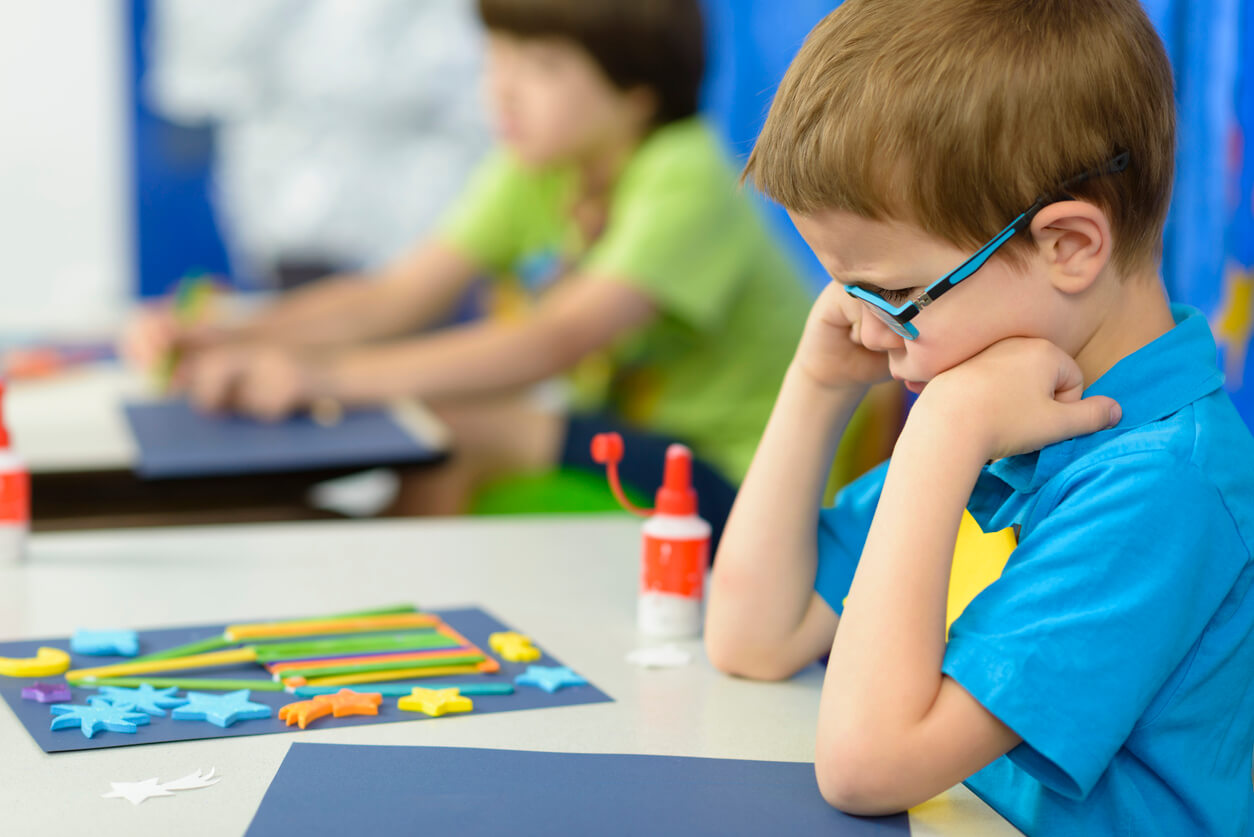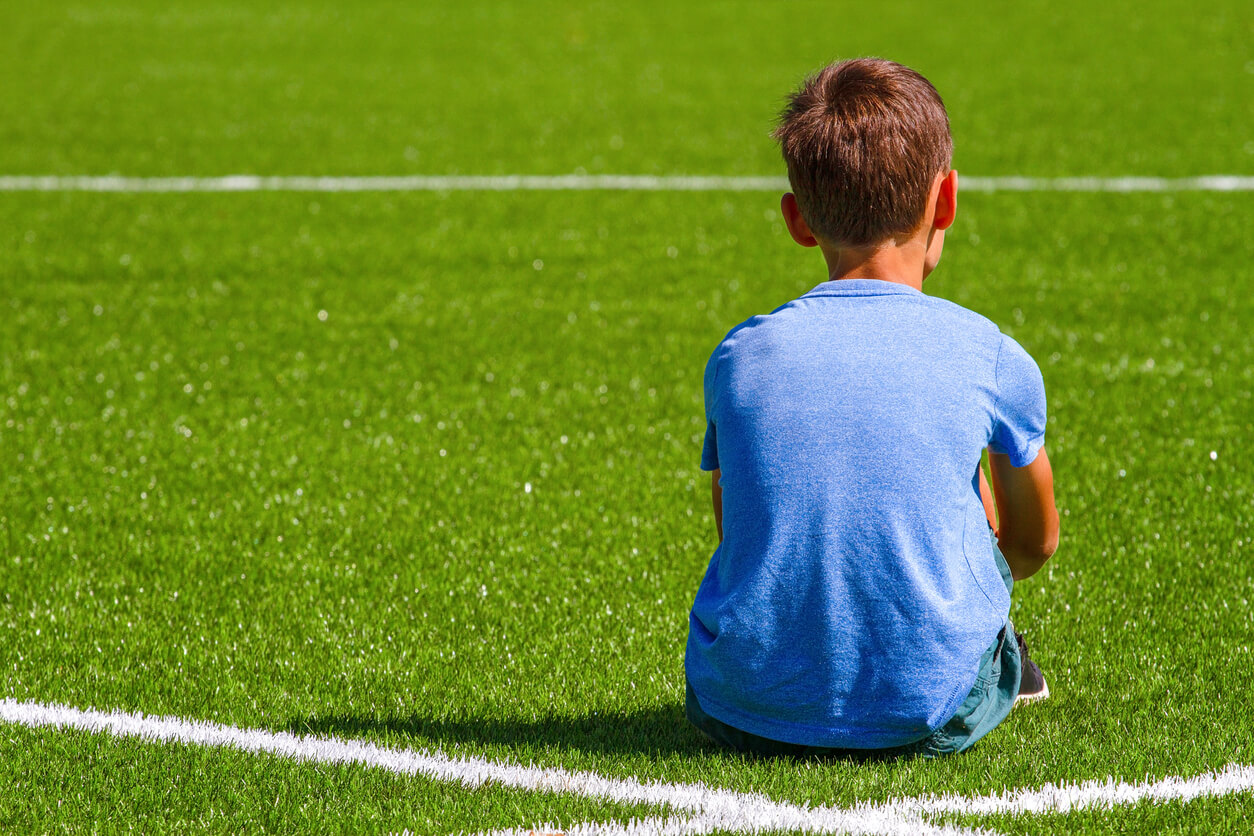My Child's a Perfectionist: How Can I Help Them?


Written and verified by the psychologist Maria Fátima Seppi Vinuales
Does your child get angry because the neighbors don’t play nicely? Do they start their drawing over and over again because they don’t turn out the way they like? Do they take too long to accomplish something simple? These are some of the behaviors that could be signs that your child’s a perfectionist.
When we think about perfectionism, we almost always manage to appreciate the positive side of the result achieved. There’s nothing wrong with wanting to do things at a level we’re happy with and, in fact, it works as a motivator. However, when the results aren’t what we want, it feels like a frustrating blow. So, how does perfectionism impact children? How can we help them? Let’s take a look at the answers to these questions in the following article.
How do I know if my child’s a perfectionist?
That’s why, in your children, some actions can be confusing, and behaviors like uncontrolled crying can mean anything from hunger to anger.
- Your child feels enormous anger and frustration when they can’t reach their goals. For example, they may have a big tantrum when the pencil line just barely misses a shape they were supposed to draw.
- They don’t like to be the butt of jokes. While they don’t conceptualize it that way, it makes them feel exposed and insecure.
- There’s no argument to justify their “failure” if they don’t win or if they don’t do well. It’s not just a game, but something that affects them and causes them intense discomfort.
- They have rigid modes of behavior. They perceive that they know the way and are in control of the situation.
- They don’t try new or unfamiliar things. They know that if they do, they may be exposed to error or failure, as things don’t necessarily go right the first time.
- They’re sensitive to criticism. If they receive it, they abandon the activity.
- They’re interested in recognition from people they consider important. For example, they want their teacher to congratulate them or recognize their work.
- They may become angry when other people’s achievements are recognized. For example, on returning from a walk, your child may become angry if you compliment their sibling for her good behavior.
You may be interested in: How to Give Constructive Criticism to Children

How can I help if my child’s a perfectionist?
Here are some strategies to consider.
Analyze the message you transmit
On the contrary, it’s important to take into account the child’s opinion, let them be the protagonists of their own lives, and encourage their autonomy.
Be careful with what you value
Teach them to value the process and their failures
Both when they achieve their goals and especially when they don’t, it’s very useful to help them focus on the process. We should ask questions about how they experienced it and emphasize how important the effort and the journey are, no matter what the result. It’s important to encourage your child to think in terms of the small steps. In this way, you move away from that place of all or nothing, an extreme in which perfectionists tend to fall.
Help them express their emotions
When a perfectionist child doesn’t achieve what they want, rather than offering a consolation such as “Don’t worry, next time will be better”, the first thing they need is to be validated in their emotion. That is, you need to facilitate the conditions for them to express how they feel and then help them manage these emotions.

Why perfectionism can be limiting
- It limits creativity, flexibility, and spontaneity.
- It affects self-esteem.
- Greater wear and tear when facing a task.
- The child experiences great frustration.
- Perfectionists attempt to impose themselves, as they consider that the way they do things is the only correct way.
- Perfectionism generates stress, anxiety, and other disorders.
- It’s impossible to enjoy many activities.
You may be interested in: How to Respond to a Very Demanding Child
Final recommendations
It’s not about telling a child that they should settle, but helping them see the real value of effort, the learning process, and even failed attempts. Also, it’s very important to be careful with the issue of “labels” during childhood. The phrase “they’re a little perfectionist” can condition the way children think and behave. At certain ages, they’re still not very clear that, with time, people can change, learn, and unlearn.
As there’s a literalness in what’s being said, we must prevent this label from becoming entrenched and causing the feeling that nothing can be done about the behaviors that make them suffer. This should be thought not only regarding children but also about their parents. Finally, in a society that encourages excessive competition, adult figures should be the compass that guides children to escape from excessive demands.
Does your child get angry because the neighbors don’t play nicely? Do they start their drawing over and over again because they don’t turn out the way they like? Do they take too long to accomplish something simple? These are some of the behaviors that could be signs that your child’s a perfectionist.
When we think about perfectionism, we almost always manage to appreciate the positive side of the result achieved. There’s nothing wrong with wanting to do things at a level we’re happy with and, in fact, it works as a motivator. However, when the results aren’t what we want, it feels like a frustrating blow. So, how does perfectionism impact children? How can we help them? Let’s take a look at the answers to these questions in the following article.
How do I know if my child’s a perfectionist?
That’s why, in your children, some actions can be confusing, and behaviors like uncontrolled crying can mean anything from hunger to anger.
- Your child feels enormous anger and frustration when they can’t reach their goals. For example, they may have a big tantrum when the pencil line just barely misses a shape they were supposed to draw.
- They don’t like to be the butt of jokes. While they don’t conceptualize it that way, it makes them feel exposed and insecure.
- There’s no argument to justify their “failure” if they don’t win or if they don’t do well. It’s not just a game, but something that affects them and causes them intense discomfort.
- They have rigid modes of behavior. They perceive that they know the way and are in control of the situation.
- They don’t try new or unfamiliar things. They know that if they do, they may be exposed to error or failure, as things don’t necessarily go right the first time.
- They’re sensitive to criticism. If they receive it, they abandon the activity.
- They’re interested in recognition from people they consider important. For example, they want their teacher to congratulate them or recognize their work.
- They may become angry when other people’s achievements are recognized. For example, on returning from a walk, your child may become angry if you compliment their sibling for her good behavior.
You may be interested in: How to Give Constructive Criticism to Children

How can I help if my child’s a perfectionist?
Here are some strategies to consider.
Analyze the message you transmit
On the contrary, it’s important to take into account the child’s opinion, let them be the protagonists of their own lives, and encourage their autonomy.
Be careful with what you value
Teach them to value the process and their failures
Both when they achieve their goals and especially when they don’t, it’s very useful to help them focus on the process. We should ask questions about how they experienced it and emphasize how important the effort and the journey are, no matter what the result. It’s important to encourage your child to think in terms of the small steps. In this way, you move away from that place of all or nothing, an extreme in which perfectionists tend to fall.
Help them express their emotions
When a perfectionist child doesn’t achieve what they want, rather than offering a consolation such as “Don’t worry, next time will be better”, the first thing they need is to be validated in their emotion. That is, you need to facilitate the conditions for them to express how they feel and then help them manage these emotions.

Why perfectionism can be limiting
- It limits creativity, flexibility, and spontaneity.
- It affects self-esteem.
- Greater wear and tear when facing a task.
- The child experiences great frustration.
- Perfectionists attempt to impose themselves, as they consider that the way they do things is the only correct way.
- Perfectionism generates stress, anxiety, and other disorders.
- It’s impossible to enjoy many activities.
You may be interested in: How to Respond to a Very Demanding Child
Final recommendations
It’s not about telling a child that they should settle, but helping them see the real value of effort, the learning process, and even failed attempts. Also, it’s very important to be careful with the issue of “labels” during childhood. The phrase “they’re a little perfectionist” can condition the way children think and behave. At certain ages, they’re still not very clear that, with time, people can change, learn, and unlearn.
As there’s a literalness in what’s being said, we must prevent this label from becoming entrenched and causing the feeling that nothing can be done about the behaviors that make them suffer. This should be thought not only regarding children but also about their parents. Finally, in a society that encourages excessive competition, adult figures should be the compass that guides children to escape from excessive demands.
All cited sources were thoroughly reviewed by our team to ensure their quality, reliability, currency, and validity. The bibliography of this article was considered reliable and of academic or scientific accuracy.
- Aguilar Durán, Leonardo Andrés, & Castellanos López, Marilyn Yisneida. (2016). PERFECCIONISMO INFANTIL: UNA REVISIÓN DE LA LITERATURA. Ajayu Órgano de Difusión Científica del Departamento de Psicología UCBSP, 14(2), 162-226. Recuperado en 14 de junio de 2021, de http://www.scielo.org.bo/scielo.php?script=sci_arttext&pid=S2077-21612016000200001&lng=es&tlng=es.
- José Manuel García-Fernández, Cándido J. Inglés, María Vicent, Carolina Gonzálvez, María Isabel Gómez-Núñez, Patricia Poveda-Serra, Perfeccionismo durante la infancia y la adolescencia. Análisis bibliométrico y temático (2004-2014), Revista Iberoamericana de Psicología y Salud, Volume 7, Issue 2, 2016, Pages 79-88,
ISSN 2171-2069, https://doi.org/10.1016/j.rips.2016.02.001.(https://www.sciencedirect.com/science/article/pii/S2171206916000028) - Oros, Laura B., & Vargas-Rubilar, Jael. (2016). Children’s perfectionism: a normalization of an argentinian scale for its measure. Acción Psicológica, 13(2), 117-126. https://dx.doi.org/10.5944/ap.13.2.17822
This text is provided for informational purposes only and does not replace consultation with a professional. If in doubt, consult your specialist.








